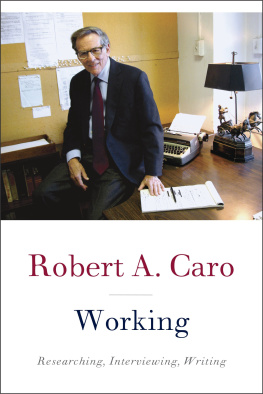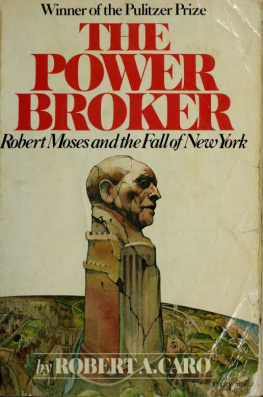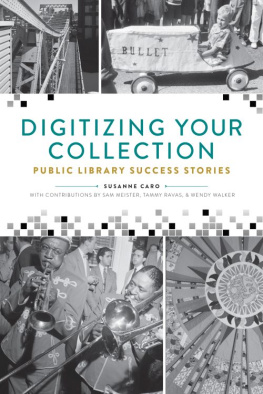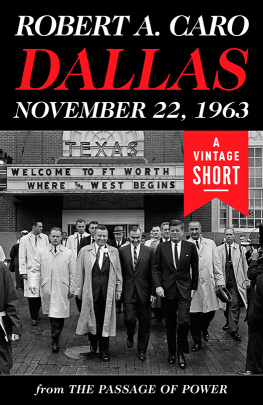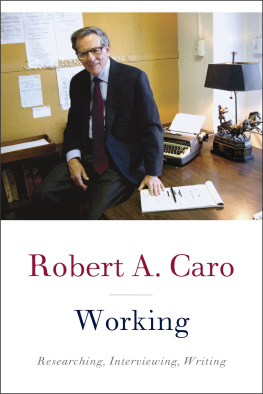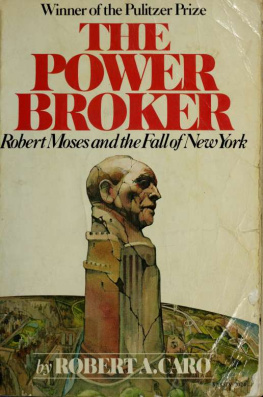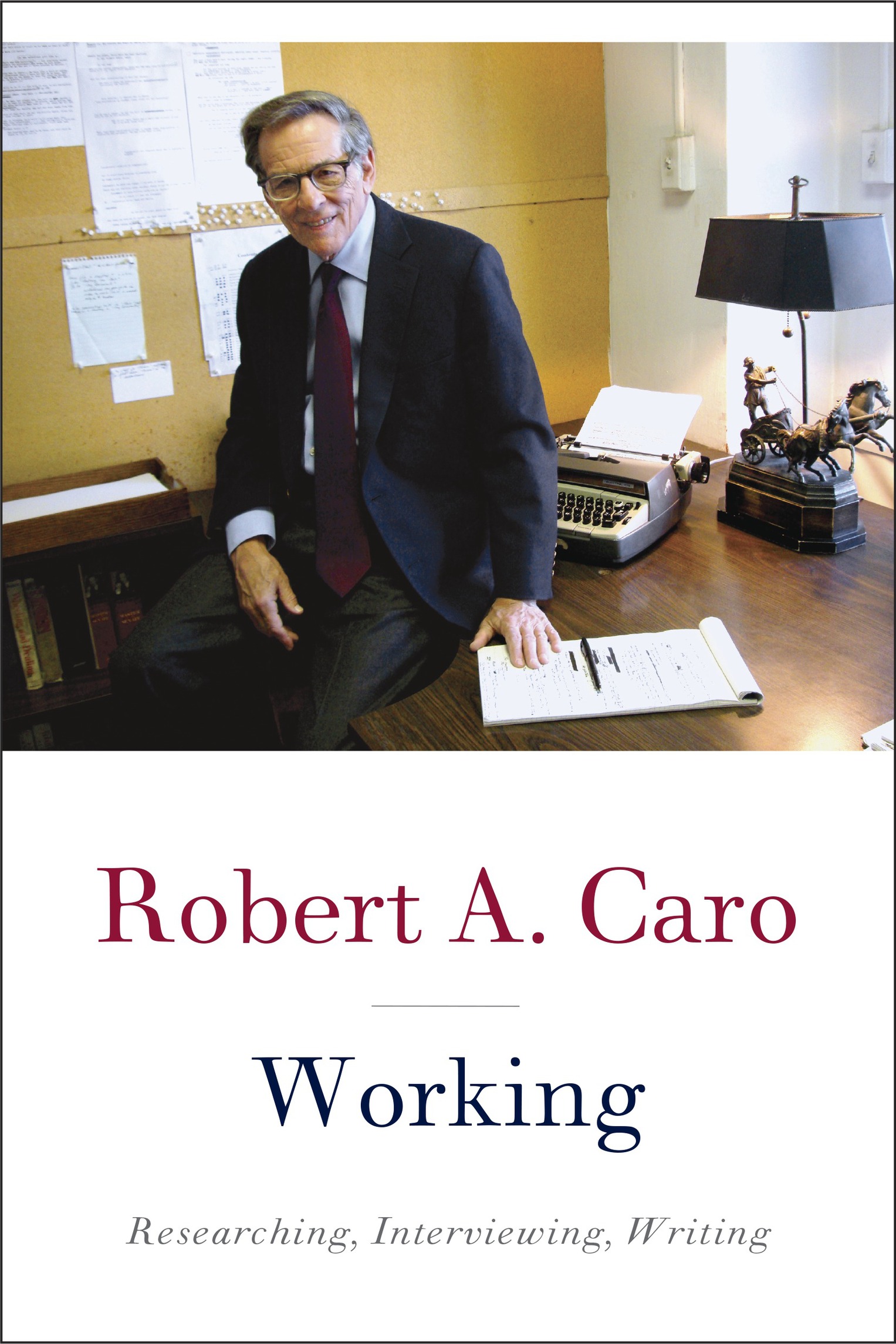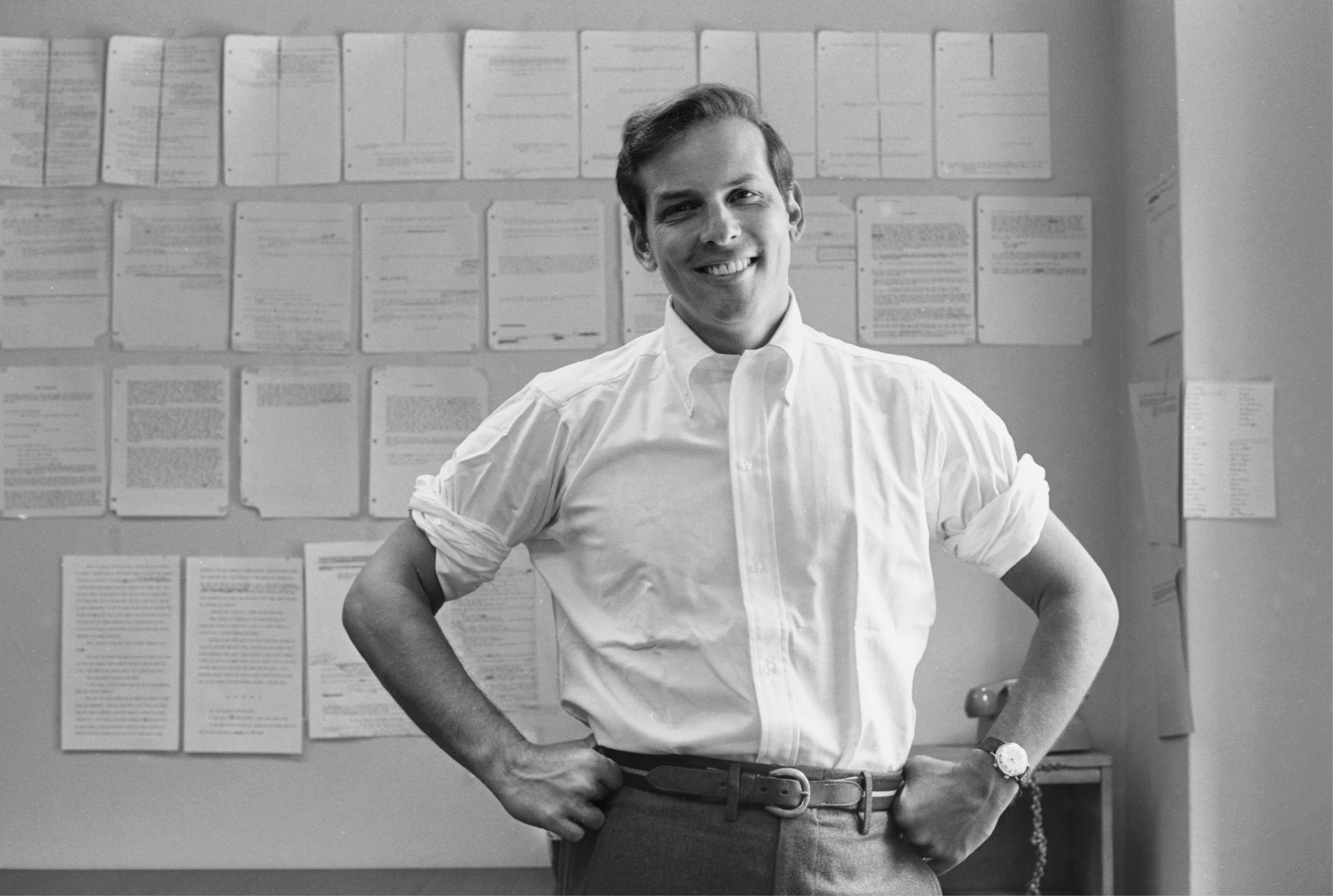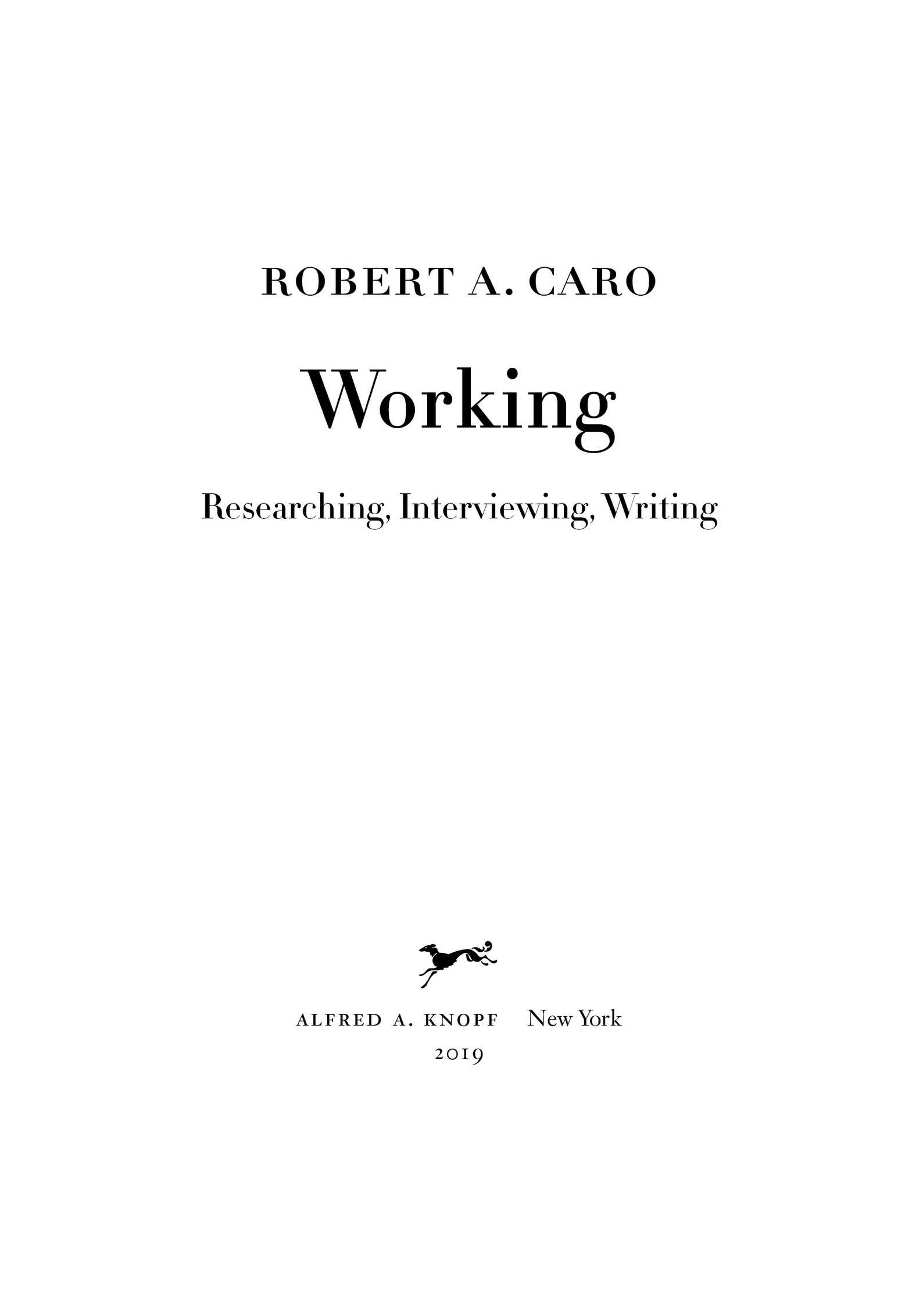ALSO BY ROBERT A. CARO
The Power Broker:
Robert Moses and the Fall of New York (1974)
The Years of Lyndon Johnson:
The Path to Power
(1982)
Means of Ascent
(1990)
Master of the Senate
(2002)
The Passage of Power
(2012)
THIS IS A BORZOI BOOK
PUBLISHED BY ALFRED A. KNOPF
Copyright 2019 by Robert A. Caro, Inc.
All rights reserved. Published in the United States by Alfred A. Knopf, a division of Penguin Random House LLC, New York, and distributed in Canada by Alfred A. Knopf Canada, a division of Penguin Random House Canada Limited, Toronto.
www.aaknopf.com
Knopf, Borzoi Books, and the colophon are registered trademarks of Penguin Random House LLC.
The City-Shaper originally appeared in The New Yorker, January 5, 1998.
Parts of Turn Every Page, LBJA, Why Cant You Do a Biography of Napoleon?, Tricks of the Trade, and Interviewing Lady Bird Johnson were excerpted in the January 28, 2019, issue of The New Yorker.
Grateful acknowledgment is made to the following for permission to reprint previously published material:
Harpers Magazine: Carbon Footprint, an interview with Robert A. Caro and John R. MacArthur. Copyright 2014 by Harpers Magazine. All rights reserved. Reprinted from the December 2014 issue by permission of HarpersMagazine.
The New York Times: Sanctum Sanctorum for Writers by Robert Caro, originally appeared in The New York Times on May 19, 1995. Copyright 1995 by The New York Times. Reprinted by permission of The New York Times.
The Paris Review: Excerpts from Robert Caro, The Art of Biography No. 5, an interview with Robert Caro and James Santel, originally appeared in The Paris Review (Issue 216, Spring 2016). Reprinted by permission of The Paris Review.
Library of Congress Cataloging-in-Publication Data
Names: Caro, Robert A., author.
Title: Working : researching, interviewing, writing / by Robert A. Caro.
Description: First edition. | New York : Alfred A. Knopf, 2019. | This is a Borzoi book published by Alfred A. Knopf.
Identifiers: LCCN 2018055999 (print) | LCCN 2019000496 (ebook) | ISBN 9780525656340 (hardcover) | ISBN 9780525656357 (ebook)
Subjects: LCSH : Caro, Robert A. | JournalistsUnited StatesBiography. | Authors, American20th centuryBiography. | Authorship.
Classification: LCC PN 4874. C 2528 (ebook) | LCC PN 4874. C 2528 A 3 2019 (print) | DDC 818/.5409 [ B ]dc23
LC record available at https://lccn.loc.gov/2018055999
Ebook ISBN9780525656357
Frontispiece photograph: Arnold Newman Collection / Getty Images
Cover photograph Joyce Ravid
Cover design by Carol Devine Carson
v5.4_r1
ep
For Ina
Beloved
Contents
Introduction
Heres a book very unlike the others Ive writtenvery much shorter, for one thing, as some readers may noticebut its intention is to share some experiences Ive had while doing the others, and some thoughts Ive had about what Ive been trying to do with those books.
Its not a full-scale memoir. I am, in fact, planning to write such a memoir and readers who prefer longer books will not be unhappy with its length. That one will describe in some detail my experiences in researching and writing my biographies of Robert Moses and Lyndon Johnsonmy experiences in learning about these two men and their methods of acquiring and using powerand it will describe also the efforts that were made to keep me from learning about these men (or their methods); in writing those biographies, I tried to keep myself out of their narratives, and seem to have done so with such success that over and over again I get asked what it was like to do them. Here, in this current book, instead, are some scattered, almost random glimpses of a few encounters Ive had while doing the research on the Moses and Johnson biographies, encounters both with documents and with witnesses. There are also a few things Ive learned or discovered, or think Ive learned or discovered, about the writing of biography and indeed nonfiction in general that Id like to share or pass along for whatever theyre worth to other writers and to readers interested in nonfiction. And here also are a few things I discovered about myself along the waystarting with a long-ago Election Day in the very tough political town of New Brunswick, New Jersey, when, a wet-behind-the-ears journalist fresh out of Princeton, I found myself riding the polls (I didnt even know what the term meant when I was invited to do so) with a very tough old political bossand about what I wanted to do with my life and my books (which are my life): how, for example, a row of tiny dots on a map helped lead me to the realization that in order to write about political power the way I wanted to write about it, I would have to write not only about the powerful but about the powerless as wellwould have to write about them (and learn about their lives) thoroughly enough so that I could make the reader feel for them, empathize with them, and with what political power did for them, or to them. Its about what it was like to sit listening to Robert Moses, old but still mighty, what it was like to interview him, to be in a room with him, alone with him (during the brief period, soon to be over, when I was allowed to sit listening to him) and hear him talk about his dreams, the dreams that had become reality, and the dreams that hadntyet. Its about what it was like to imagine that I had, during the years I had been a journalist, learned something about how political power workedand then to realize, as Robert Moses talked, that compared with him I knew nothing, nothing at all; that there was a whole level of political power, not what I had learned from textbooks and lectures in college and not even what I had learned as a political reporter, but a level of which I had hardly ever conceived. And, listening to Commissioner Moses, I learned there was a whole level of ruthlessness, too, of which I also hadnt conceivedlearned it the hard way, interviewing the people whose lives he had destroyed, people who lived in the way of his roads, and peoplepublic officials or reformerswho stood in his way period.
THIS BOOK ALSO OFFERS a few glimpses into why I work the way I dointo why, for example, it takes me so long to produce my books. I am constantly being asked why it takes me so long, and when I say that Im actually a very fast writer, people can barely conceal their disbelief and amusement. Yet when I was working at Newsday I was for a time on the rewrite desk, and I was known as a very fast rewrite man. When a murder or a plane crash occurred, I would don my headset as I sat before my typewriter, and reporters on the scene would telephone in to me what was going on, and as I sat there listening to their reports, I could turn out copy at a rate that seemed to astonish some of my colleagues.
When I left Newsday to write a book on Robert Moses a change occurred, for, at the beginning of this enterprise, I found myself remembering what R. P. Blackmur, a courtly, soft-spoken southern gentleman, famous at the time as a literary critic, had said to me years before, on the final occasion we met to discuss a short story I had written in his creative writing course at Princeton. We had to write a short story every two weeks, and I was always doing mine at the very last minute; I seem to recall more than one all-nighter to get my assignment in on time. Yet Professor Blackmur was, as I recall, complimentary about my work, and I thought I was fooling him about the amount of preparation and effort I had put into it. At that final meeting, however, after first saying something generous about my writing, he added: But youre never going to achieve what you want to, Mr. Caro, if you dont stop thinking with your fingers.

